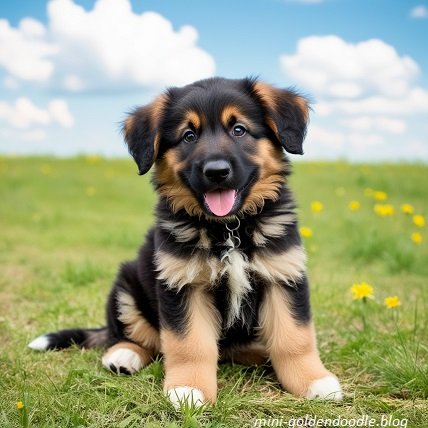Introduction
Investing in a puppy german shepherd can provide years of happiness, growth, and companionship. For these bright and active canines to grow up to be well-mannered and healthy adults, they need specialized training and care. Whether you’re an experienced pet parent or a first-time dog owner, knowing the special requirements and traits of German Shepherd pups will enable you to provide your new pet the best possible home.
Understanding the German Shepherd Breed
Origins and History
Because to Max von Stephanitz’s efforts to develop the ultimate working dog, the German Shepherd breed got its start in Germany in the early 1900s. The breed was created by crossing different herding dogs, with an emphasis on traits like strength, intelligence, and adaptability. German Shepherds are employed in many different capacities nowadays, such as search and rescue, law enforcement, and as devoted family members.
Physical attributes
puppy german shepherd are distinguished by their unique appearance, which includes erect ears, a double coat that can be solid black, sable, or black and tan, and a powerful, athletic frame. Puppies usually have a softer coat to begin with, but as they grow older, their coats become more resilient to the elements.
What to Look for in a German Shepherd Puppy
Well-being and Health
Make sure a puppy german shepherd is healthy and free of frequent hereditary diseases when choosing one. Reputable breeders should give the parents of the puppy health clearances, including elbow and hip dysplasia tests and other genetic testing.
Temperament and Socialization
Watch how the puppy behaves and engages with both people and other puppies in its litter. A puppy that has been socialized should be lively and inquisitive, but not overly timid or aggressive. Early exposure to a variety of stimuli helps puppies adapt better to new situations and experiences.
Preparing Your Home for a German Shepherd Puppy
Establishing a Secure Environment
Establish a secure and cozy space before bringing your new puppy home. This might be a puppy-proofed room with a bed, toys, and water, or it could be a crate. Because puppy german shepherd are inquisitive and prone to mischief, it is imperative that you make sure your home is safe from potential dangers.
Bringing the Puppies Inside
Take out everything that could hurt your puppy, including small objects that could be ingested, poisonous plants, and electrical cables. Keep household chemicals out of reach and secure garbage cans. Making sure your house is puppy-proof will help reduce accidents and facilitate a more seamless introduction for your new companion.
Nutrition and Feeding Guidelines for German Shepherd Puppies
Selecting the Correct Food
Puppies of German Shepherds require particular nourishment in order to assist their quick development and growth. Select a premium puppy food that is high in necessary nutrients and protein. Seek out brands that adhere to the guidelines established by the Association of American Feed Control Officials (AAFCO) and that are endorsed by veterinarians.
Feeding Schedule
Set up a regular feeding plan to assist in controlling your puppy’s activity and digestion. Up until they are around six months old, puppies normally require three to four meals a day. After that, you can switch to feeding them just twice a day.
Essential Training Tips for German Shepherd Puppies
Fundamental Training in Obedience
Begin by giving simple instructions like “sit,” “stay,” “come,” and “down.” To promote positive conduct, use strategies for positive reinforcement like praise and treats. German Shepherds pick things up quickly, so consistency and patience are essential. They also want clear direction.
Taking Care of Behavioral Problems
Puppies of puppy german shepherd frequently exhibit gnawing, barking, and digging behaviors. Redirect your puppy’s attention to appropriate toys and give him lots of exercise and mental stimulation to help address these habits early on.
Socialization: Why It’s Crucial and How to Do It
The Value of Socialization
For puppy german shepherd to become well-adjusted adults, socialization is essential. Introducing your puppy to a variety of people, animals, and surroundings will boost their self-assurance and adaptability.
Methods of Socialization
Introduce your puppy to new experiences gradually, beginning with low-stress circumstances and escalating in difficulty over time. You should utilize positive reinforcement to show your puppy appreciation for his poise and self-assurance.
Conclusion
A puppy german shepherd is a pleasant experience, but it does demand commitment, careful planning, and continuous care. You can guarantee a happy and healthy life for your new furry friend by being aware of the breed’s distinctive traits, giving appropriate training and socialization, and attending to their dietary and grooming requirements. A healthy and happy relationship with your German Shepherd can be established by picking a trustworthy breeder and getting your home ready for a puppy.
FAQ
How big will my German Shepherd puppy get?
puppy german shepherd range in size from modest to large. Generally speaking, females weigh between 50 and 70 pounds, and men range between 65 and 90 pounds. By the time they are 18 to 24 months old, they often attain their full size.
When should I start training my German Shepherd puppy?
As early as eight weeks old, your puppy german shepherd can start training. In order to mold their behavior and guarantee that kids grow up to be well-adjusted individuals, early instruction is essential.
How often should I groom my German Shepherd puppy?
Because puppy german shepherd shave all year round, frequent brushing is necessary. Brush your puppy’s coat two or three times a week minimum to prevent shedding and maintain the health of their coat. Moreover, provide them ear cleanings and nail trims as needed.

